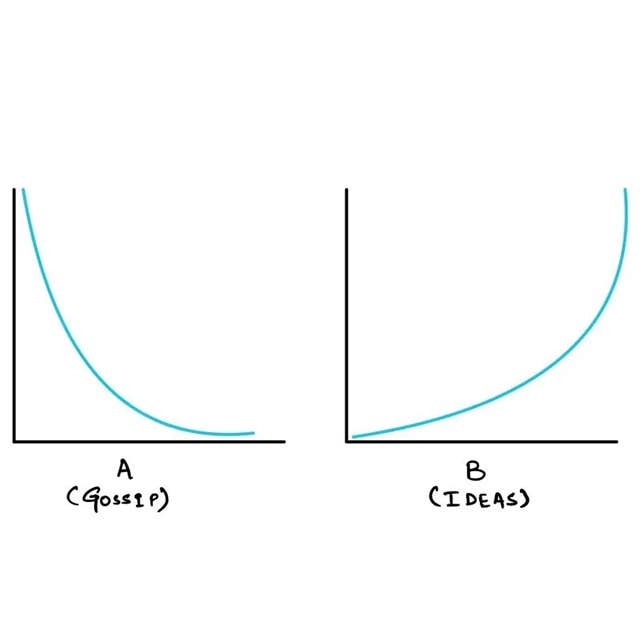4 Things The Highest-Level Thinkers Never Do
And what they do instead.
 ktsimage / Getty Images via Canva, Powerlightss / Shutterstock
ktsimage / Getty Images via Canva, Powerlightss / Shutterstock High-level thinking requires you to outgrow certain natural instincts.
Because it’s not like someone is born a great thinker. We’re all born average thinkers, and we have some natural instincts wired into our brains. T
hese instincts help at times, however, they also prevent us from higher-level thinking. To evolve as thinkers, we need to learn to outgrow these instincts.
Here are 4 things high-level thinkers never do:
1. They don’t gossip
Check out these graphs.

- Graph A shows how gossip navigates people’s minds. When a gossip-worthy event happens, almost everyone talks about it. And it spreads like fire. However, over time, it becomes old news. And then, it becomes so normal in people’s minds, that they don’t feel the need to talk about it. In essence, gossip starts off aggressively but is bound to die very soon.
- Graph B shows how ideas navigate our collective human consciousness. An idea starts off very slow; like a minor spark in someone’s mind. And then, it grows in that person’s mind. They might tweak it, add to it, and expand it further. Then the idea is shared with others. And they further grow in the minds of all people who know about that idea. And eventually, it might reach infinity.
Take Medium for example. It must have started off as a little idea in Ev’s mind. Then it must have grown. Eventually, it grew big enough that the idea needed a whole team to tend to it. A platform was created. People shared their ideas on it. The partner program was introduced. People started making actual money off the platform. It served as a vessel for the incubation of some truly extraordinary thoughts.
And today, it’s a platform larger than one can comprehend, providing an opportunity to so many creators, helping them make real money off of their skills, and allowing truly great ideas to spread.
And it all must have started as a single thought in Ev’s mind. A single idea has now turned into a vessel for the generation of millions of ideas.
The message here is this: why do you want to waste your time gossiping when you know your gossip’s gonna die a very early death? Instead, don’t you think you should talk about ideas; ideas that can grow to pierce geographical, and generational boundaries, and live forever? That’s what high-level thinkers do.
"Great minds discuss ideas. Average minds discuss events. Small minds discuss people." — Eleanor Roosevelt.
- Average thinker: Talks about people and events
- High-level thinker: Talks about ideas
2. They don’t play to win now
A few weeks ago, I went to play tennis with a friend. We had a friendly match of a single set, and the stakes were nothing. But of course, we all have a desire to win. So I played well.
I have a weak backhand. And a strong forehand. So in the game, I’d often run extra and convert my backhands into forehands so that I made lesser mistakes. And it helped. I ended up winning the match. I felt mighty.
But a few days ago, I watched one of Kobe Bryant’s interviews. In it, he said something that completely shook my mind:
"And when I’d play, I’d play to my weaknesses. Because when you’re playing summer basketball, there are so many games. So there is not a lot of ‘skill work’ being done, so when are you gonna get better, right? When you’re playing in competition situations, you’re only playing to your strengths. Why? Because you want to win. So what I would do, I’d always work on those things, during those [low stake] games that I was weak at. Left hand, pull-up jump shot, post-game. So I have a strategy. And so then, fast forward to when I’m 17, and my game is completely well-rounded, and that player at 13 that I saw at 13 is still doing the same crap at 17, now you’ve got a problem."
All the mightiness I felt earlier turned into the embarrassment of an epiphany.
Think about that. Kobe knew this when he was thirteen. He knew that you should prioritize long-term victories over short-term ones. Meaning, instead of trying to win that stupid friendly game, I should have worked on my backhand, so that long term, my game would have been better.
Kobe knew this from the beginning. And hence, it’s no wonder why he turned out to be one of the best athletes the world has ever seen. He’s one of the greatest minds of all time, and prioritizing long-term big victories over short-term smaller ones is a lesson you need to learn from him.
- Average thinker: Plays to win the short game.
- High-level thinker: Plays and wins the long game.
3. They don’t act with less rational thoughts
Whenever any event occurs, our mind responds to it by sending out a stream of thoughts. The thoughts that come in initially are borne out of fast thinking, and the thoughts that come in later are borne out of slow thinking. This is the essence of the book Thinking Fast and Slow by the Nobel Prize winner, Daniel Kahneman.
- Fast thinking: Since it needs to be fast, this kind of thinking is only possible by taking shortcuts. This means that only a small amount of info will be taken into consideration before thoughts are sent out. This means that fast thoughts are less rational.
- Slow thinking: It follows fast thinking. And it considers increasingly more pieces of information before sending out thoughts. Consequently, slow thinking sends out more rational thoughts.
This is why you’re asked to take your time before making an important decision.
However, most of us don’t do this. We have the ability to think before we act, but for the most part, we act before we think. But high-level thinkers don’t do so. They know that in many situations (not all), their initial thoughts are pure junk. While normal people act on these, they reject them. They wait. They wait patiently for smarter thoughts to flow in before acting. A few examples:
- When someone asks them for a favor, they ask for some time to decide, instead of saying yes and making a commitment immediately.
- When they’re angry, they wait to speak or act. Whenever Marcus Aurelius lost his temper, he used to count the letters of the alphabet, instead of acting with an angry mind.
Simply put, if you want to access the smarter parts of your brain, learn to slow down. If you want to read more on this topic, here’s an article you can check out.
- Average thinker: Acts before he can think.
- High-level thinker: Thinks before he acts.
4. They don’t reject a problem that’s out of their league
My favorite professor in medical school once said that as a doctor, your brain and hard work will be useless if you’re not in the right place. He meant that if you’re studying in a less established institute, you’ll not learn a lot, because they’ll refer all complex cases to higher centers. If you want to learn how to solve the most complex problems, you need to be at a place that accepts those problems, instead of passing them on.
This holds for people too. For example, whenever an employee encounters an issue that’s out of his league, he might pass it on to his boss. This is because of cognitive miser function; our brains’ tendency to choose the option that’s less cognitively challenging.
But high-level thinkers don’t do this. Unless the problem needs an urgent solution, they try their best to solve it. And in the process, they learn a lot, even if they are not actually able to find a solution; because at least, they understand the problem better.
You have to realize that if you keep passing on complex problems to your superiors, you’ll never be at their level. You need to start solving problems that are at least a little out of your league. When you do this enough → You’ll level up in your skills → and then you’ll receive a title or promotion that goes with it.
Most people have it reversed. They feel they’ll solve bigger problems when they get a promotion. No. Solving bigger problems is the prerequisite to promotion.
- Average thinker: Passes on a complex problem to someone else
- High-level thinker: Tries to solve problems out of their league
To evolve into a high-level thinker, you need to outgrow your low-level thinking tendencies. Here are four things that high-level thinkers don’t do:
- They don’t gossip a lot. They talk about ideas.
- They don’t play the short game.
- They don’t act before they have thought well.
- They don’t pass on complex problems to their superiors without at least having given them an exhaustive try.
Akshad Singi, M.D. has been published in Better Humans, Mind Cafe, and more.

